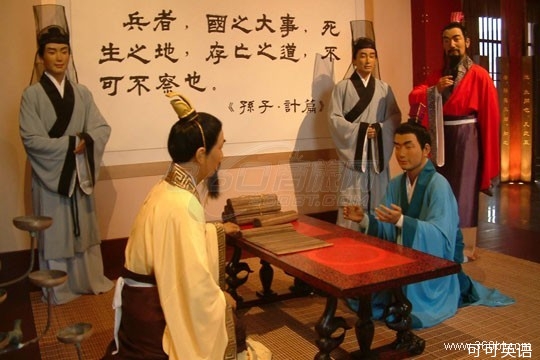九地篇 NO.2:
2.古之善用兵者,能使敵人前后不相及,眾寡不相恃,貴賤不相救,上下不相收,卒離而不集,兵合而不齊。
合于利而動,不合于利而止。
敢問:“敵眾整而將來,待之若何?”
曰:“先奪其所愛,則聽矣。”
兵之情主速,乘人之不及,由不虞之道,攻其所不戒也。

這句啥意思:
從前善于指揮作戰的人,能使敵人前后部隊不能相互策應,主力和小部隊無法相互依靠,
官兵之間不能相互救援,上下級之間不能互相聯絡,士兵分散不能集中,合兵布陣也不整齊。
對我有利就打,對我無利就停止行動。
試問:敵人兵員眾多且又陣勢嚴整向我發起進攻,那該用什么辦法對付它呢?
回答是:先奪取敵人最關心愛護的,這樣就聽從我們的擺布了。
用兵之理貴在神速,要乘敵人措手不及的時機,走敵人意料不到的道路,攻擊敵人沒有戒備的地方。
英文這么說:
Those who were called skillful leaders of old knew how to drive a wedge between the enemy's front and rearto prevent co-operation between his large and small divisions;to hinder the good troops from rescuing the bad,the officers from rallying their men.When the enemy's men were united, they managed to keep them in disorder.When it was to their advantage, they made a forward move; when otherwise, they stopped still.If asked how to cope with a great host of the enemy in orderly array and on the point of marching to the attack,I should say: "Begin by seizing something which your opponent holds dear; then he will be amenable to yourwill."Rapidity is the essence of war: take advantage of the enemy's unreadiness, make your way by unexpected routes,and attack unguarded spots.
單句理解
所謂古之善用兵者,能使敵人前后不相及,眾寡不相恃,貴賤不相救,上下不相收,卒離而不集,兵合而不齊。合于利而動,不合于利而止。孫子在這里提出了“和余力而動,不合于利而止”的戰爭指導原則。這種原則主要是使敵人前后不能相救,上下不能相及,從而阻斷敵人內部的有機聯系,達到降級敵人戰斗力的目的。總之,軍事行動要以對我方有利為原則。











